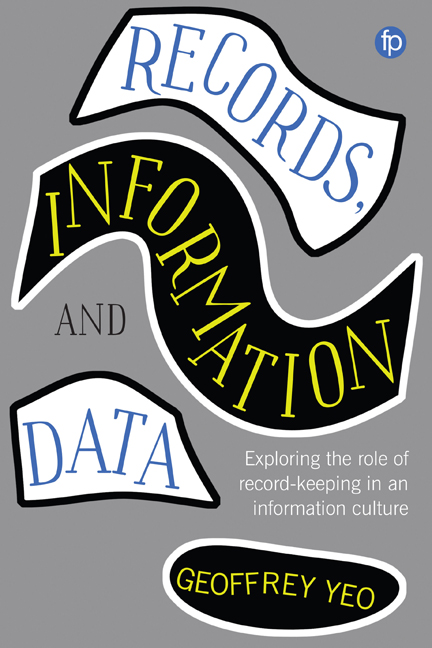Book contents
- Frontmatter
- Contents
- Introduction
- 1 The Making and Keeping of Records: a Brief Historical Overview
- 2 Thinking About Records and Archives; the Transition to the Digital
- 3 Archivists, Records Managers and the Rise of Information
- 4 Finding a Way Through the Hall of Mirrors: Concepts of Information
- 5 Records and Data
- 6 Representation, Performativity and Social Action: Why Records Are Not (Just) Information
- 7 Managing Information or Managing Records?
- Concluding Thoughts: Record-Keeping Present and Future
- Index
1 - The Making and Keeping of Records: a Brief Historical Overview
Published online by Cambridge University Press: 24 September 2019
- Frontmatter
- Contents
- Introduction
- 1 The Making and Keeping of Records: a Brief Historical Overview
- 2 Thinking About Records and Archives; the Transition to the Digital
- 3 Archivists, Records Managers and the Rise of Information
- 4 Finding a Way Through the Hall of Mirrors: Concepts of Information
- 5 Records and Data
- 6 Representation, Performativity and Social Action: Why Records Are Not (Just) Information
- 7 Managing Information or Managing Records?
- Concluding Thoughts: Record-Keeping Present and Future
- Index
Summary
Written down so as not to forget.
Mesopotamian clay tablet, about 3200 years ago (Postgate, 2013, 198)Things that we are unable to hold in our weak and fragile memories are conserved by writing.
Burgundian charter, about 850 years ago (Fentress and Wickham, 1992, 8)‘I shall never, never forget!’ [said the White King]. ‘You will, though,’ the Queen said, ‘if you don't make a memorandum of it’.
Through the Looking Glass, and What Alice Found There (Carroll, 1872)Introduction
The making and keeping of records appear to be among the oldest human activities. As far as we can tell, they are distinctively human activities; no other species has developed them in the same way. As well as being dependent on changing technologies, they are deeply entwined in social conventions and have been undertaken very differently at different times and in different places. Records have often been associated with literacy and the use of written texts, but the first records were undoubtedly made long before writing was invented. As record-making and record-keeping practices matured, they came to underpin governments, institutions and commercial businesses in formal public realms; they have sometimes – although not always – been less responsive to the needs of individuals, informal communities or minority groups. This chapter looks at some of the key aspects of their historical development. It aims to set a context for the record-making and record-keeping practices of our own era, by examining some of the ways in which records have been perceived, used, valued and protected in the past.
Record-making and record-keeping over 10,000 years
In today's western societies, we can use an extensive range of tools and artefacts to assist us when we need to recall what was said or done at earlier moments. We often take such tools for granted, but we also know that people in earlier eras were not always able to call on them. In prehistoric times, spoken language enabled our distant ancestors to communicate and share memories with others, but the long-term survival of memories must have depended on mental recollection and perhaps on ceremonies, recitations or rituals that may have helped to protect them from oblivion.
Information
- Type
- Chapter
- Information
- Records, Information and DataExploring the Role of Record Keeping in an Information Culture, pp. 1 - 28Publisher: FacetPrint publication year: 2018
